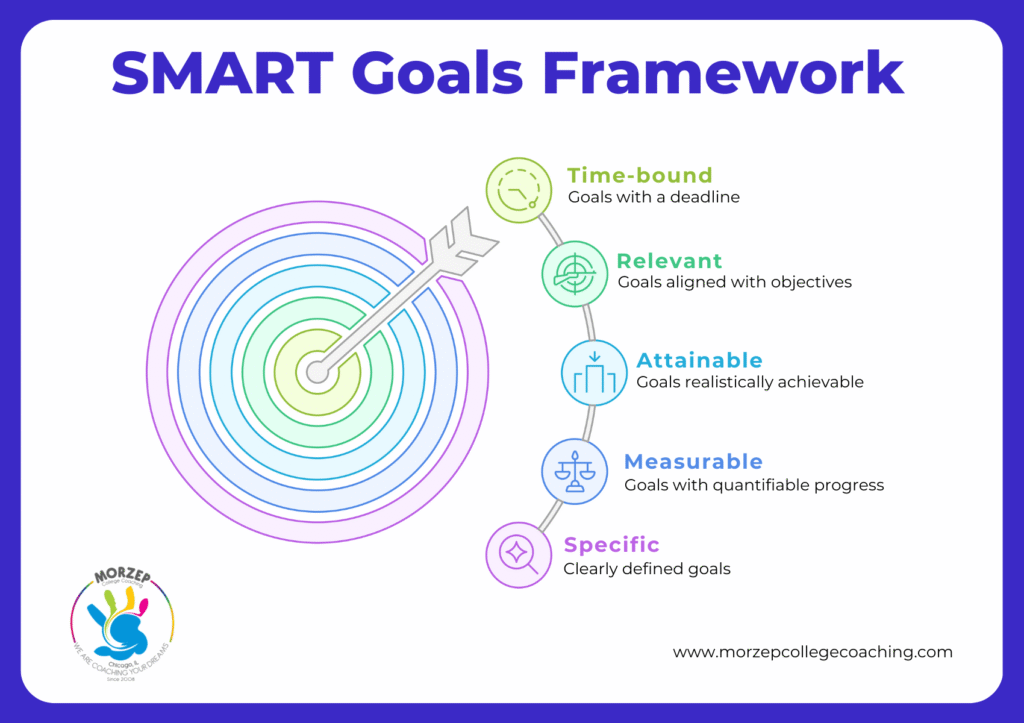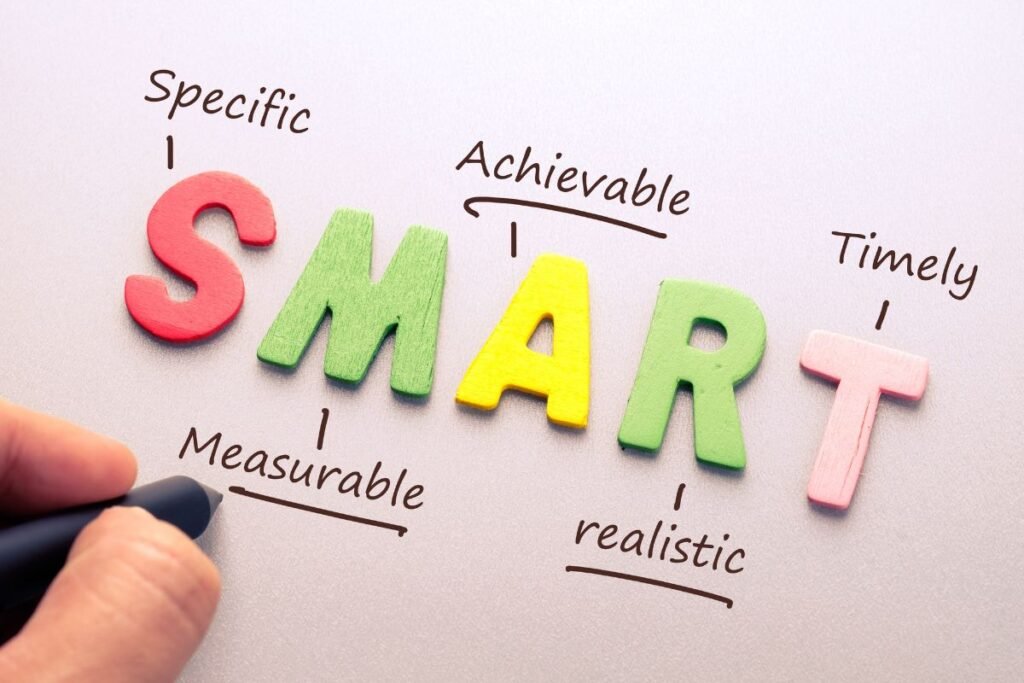Did you know that setting the right academic goals is one of the keys to making sustainable progress? In one study, 69 percent of the students who set SMART goals achieved notable progress. In comparison, such progress occurred for 60 percent of students before they set goals in a measurable and actionable way.
So, what exactly are some SMART goal examples for students, and how do they work?
In this guide, you’ll discover important facts, SMART goals examples for students, and actionable tips like:
- Personal goal setting for long-term success
- The benefits of the SMART system for the achievement of academic success
- Ways to improve your academic performance with SMART goals
- Effective goal setting for personal growth
- SMART goal examples for both academic and personal success
- The key to unlocking your full potential for long-term success

What Are SMART Goals for Students?
Do you want to achieve the best you’re capable of? Setting goals helps you track progress and make the most of every learning opportunity.
SMART is an acronym that stands for:
- Specific
- Measurable
- Attainable
- Relevant
- Time-bound

The Corporate Finance Institute reports that SMART goals speed up the journey toward success by helping you determine the right priorities and pursue those most consistently. The framework breaks down larger projects into SMART objectives and employs concrete criteria to measure the success that you want to accomplish.
With the SMART method, a student has a very specific idea of what needs to be done and how to get there. Furthermore, progress becomes easy to track. The SMART goal framework allows you to come up with a precise time frame for the completion of a project. It also enables the setting of very specific targets or milestones, aimed at encouraging you and showing you just how much progress you’ve made.
So, what are some SMART goal examples for students, and how does the corporate framework apply to educational goals? Keep reading to find out.
What is a SMART goal example for students?
A SMART goal for students could be: “Improve my math grade from a B to an A by the end of the semester by studying for one hour every weekday and attending weekly tutoring sessions.”
The Benefits of Using SMART Goals for College Students
Academic success depends on many things – having a proclivity for the respective discipline, being driven, and having a consistent routine that you stick with even through challenging moments.
Even the best students, however, can struggle in the absence of direction and strategic planning. SMART goals can focus efforts, help students meet due dates through better time management, and even simplify career planning in the future.
Employing SMART goal examples for students empowers you in a couple of very important ways.
- Developing discipline and self-control: Future success is heavily dependent on your discipline and consistency in terms of goal setting. Through SMART goal setting, you will learn how to focus on one task at a time and see it through to the end. You’ll also feel motivated by achieving objectives, pushing you to continue working towards bigger goals.
- Maximizing self-motivation: Achieving major life goals is all about maintaining self-motivation even in the toughest of moments. The system allows you to set achievable goals. You will notice the progress being made, which will give you the fire to continue working and reaping the benefits of your efforts.
- Sharpening your problem-solving skills: The SMART goal-setting method is heavily dependent on finding creative solutions and employing strategies aimed at delivering optimal outcomes. You will face challenges along the way. When you have very concrete and measurable goals, however, you’ll find it fairly easy to discover working solutions for those.
- Taking ownership of your academic performance: The SMART goals framework puts you in charge. It helps you understand a very important fact – you’re the only person in charge of progress and success. Taking ownership is so tremendously empowering, and that switch in mindset is often the biggest prerequisite for unlocking one’s true potential.
Speak with a college coach today!
Speak with an expert college coach and learn if working with one is right for your academic journey. Free 15-minute consultation, no cost, no obligations.
SMART Goal Examples for Students: Attainable Academic Success
Now that you understand how SMART goals apply to broader objectives, let’s examine a couple of realistic SMART goals examples for students. SMART goals are specific, time-based, and formulated in a way to set you up for success.
- Improving grades: Set a very specific goal, like getting an A on your next biology exam. The goal is SMART because:
- S: You have a specific goal that relates to a particular academic discipline and an upcoming event (your next test).
- M: The measurement you’re going to use is the grade you’ll get.
- A: The goal is attainable, for example, because you had an A- in your previous biology exam. You know that you can get there.
- R: Very relevant for the long-term goal of graduating with honors. It will impact your report card, which is considered an important measure of academic accomplishment.
- T: There’s a very realistic time frame for achieving the goal because the next biology exam is in 10 days.
- Completing all homework on time:
- S: You will be asked to turn in your homework on a certain date, meaning you have a specific outcome to accomplish before that time.
- M: Success will be measured by your ability to turn in all homework on time.
- A: The goal is achievable because you’ve given up on a few parties this week to dedicate enough time to homework completion.
- R: As a form of performance evaluation, homework is very relevant to maintaining a good academic track record.
- T: The time period you have for homework completion is very specific and non-negotiable.
- Memorize 100 French language flashcards in two weeks:
- S: The goal is very specific as it pertains to learning a new language.
- M: As far as SMART criteria go, the goal is measurable because a friend will easily test you and provide feedback on your progress.
- A: This goal is achievable because you have a proclivity for language learning, and your vocabulary is already extensive enough.
- R: Achieving this goal will help you excel in French class and also give you an important skill you can use in the future.
- T: You have set a very specific timeframe for the completion of the goal that’s based on your skills and upcoming French class tests.
These are just a few examples of very specific and academic SMART goals that students can employ to easily track their progress. Other relevant goals could include participating in class more often, studying for an hour per day each day after school, improving research skills, and maintaining a study journal.
How do you write SMART goals for learning?
To write a SMART goal for learning, clearly state what you want to learn, how you’ll measure progress, and set a deadline. Example: “Learn 50 new Spanish vocabulary words in four weeks by practicing 15 minutes daily and testing myself every Friday.”
SMART Goal Examples for High School Students: Achieving Personal Growth the Easy Way
The same framework you use to break down academic projects into manageable steps can be applied to personal development. Let’s check out a few examples and the reasons why they qualify as SMART:
- Maintaining a good sleep schedule:
- S: I will do my best to get eight hours of sleep per night by going to bed at 11 pm and waking up at 7 am.
- M: Setting a morning alarm and going to bed on time will make it easy to track how much sleep I’ve gotten.
- A: The goal is attainable – I’ve already given up on late-night parties and Netflix watching till 2 pm.
- R: Better sleep will make me more focused and productive during the day.
- T: I will try to stick to the new sleep schedule until the end of the academic term.
- Complete one skill course or seminar per month:
- S: I have a definitive objective that relates to the broader goal of acquiring new skills.
- M: It’s very easy to check back whether one seminar has been completed each month.
- A: I have enough time to dedicate to at least one course each month.
- R: The goal is aligned with pursuing a specific career or my broader objectives.
- T: I will check progress monthly.
A few other examples of personal development SMART goals include working out at least once per week, starting a gratitude journal and having one new entry in it each day for a month, reading one new book each month, or meditating 10 minutes each morning to gain better control over emotions.
What would be a career SMART goal example for students?
A career SMART goal for students could be: “Complete two online courses in digital marketing within the next three months to strengthen my resume and prepare for a summer internship application.”
Are You Making the Most of Academic Opportunities with SMART Goal Setting?
High school students, college students, and everyone in between can benefit from this powerful tool because it’s easy to employ. Living with purpose, pinpointing the ultimate goal, and maintaining motivation, however, can sometimes be challenging.
We can help you gain clarity and maintain a clear perspective of what’s important and what isn’t. Morzep college coaches will work to get to know you better and understand your priorities in life. Together, we’ll find it much easier to set SMART goals, track progress, and celebrate every single success that you’re most definitely capable of. We will also help you choose a college and get ready for the admissions process!





